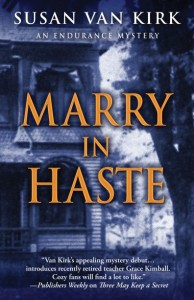 Relevant History welcomes Susan Van Kirk, who grew up in Galesburg, Illinois, and received degrees from Knox College and the University of Illinois. She taught high school English for thirty-four years, then spent an additional ten years teaching at Monmouth College. Her first Endurance mystery novel, Three May Keep a Secret, was published in 2014 by Five Star Publishing/Cengage. In April, 2016, she published an Endurance ebook novella titled The Locket: From the Casebook of TJ Sweeney. Her third Endurance novel, Death Takes No Bribes, will follow Marry in Haste. To learn more about her and her books, visit her web site and blog, and follow her on Facebook, Twitter, and Goodreads.
Relevant History welcomes Susan Van Kirk, who grew up in Galesburg, Illinois, and received degrees from Knox College and the University of Illinois. She taught high school English for thirty-four years, then spent an additional ten years teaching at Monmouth College. Her first Endurance mystery novel, Three May Keep a Secret, was published in 2014 by Five Star Publishing/Cengage. In April, 2016, she published an Endurance ebook novella titled The Locket: From the Casebook of TJ Sweeney. Her third Endurance novel, Death Takes No Bribes, will follow Marry in Haste. To learn more about her and her books, visit her web site and blog, and follow her on Facebook, Twitter, and Goodreads.
*****
The small town of Endurance, in the heart of the Midwest, is the setting of my mysteries. I wrote Marry in Haste, my second novel, to explore the changes in community attitudes and law enforcement regarding domestic violence/abuse. Although my book isn’t graphic about violence, I wanted to know more about this subject, especially its history and its psychological aspects. Creating two separate plots, I explored two marriages, one in 1893 and the other in the present day. Neither wife listened to Ben Franklin’s admonition to “Marry in haste, Repent at leisure.”
1893 Endurance
In 1893, seventeen-year-old Olivia Havelock travels from a farm community to her great aunt’s in Endurance, where she will learn the social graces and find a suitable husband. In that time, public sentiment favored short engagements because a long courtship might result in calling off the wedding. She quickly catches the eye of Judge Charles Lockwood, a forty-five-year-old widower, both powerful and wealthy. Four months later they are married, and then her nightmare begins. Lockwood is an abusive husband, and Oliva has little recourse from the laws, the police, and the courts.
Does history support this fictional idea? American law regarding domestic violence was founded on English law. In the time of British jurist, Sir William Blackstone [1723-1780], community attitudes and laws stated that a husband was responsible for correcting his wife’s behavior. Her words or actions, especially if they reflected poorly on her husband, could result in a beating or even murder. However, if she were to murder her abusive husband, her punishment could result in being quartered and burned alive.
By the time the Puritans arrived in the New World, they frowned on domestic abuse. However, their lack of enforcement rarely resulted in safety for their wives or children. By the late 1800s, a man was not punished for assaulting his wife. He could beat, choke, pull her hair or kick her repeatedly with impunity. Some states had a “curtain rule.” The law and courts “close” the window curtain of a home and allow spouses to solve their domestic problems. This attitude would be reflected a century later in the lax enforcement of marital abuse by police departments.
Young Olivia Lockwood has no legal help. The family doctor never asks her about her bruises; society notices, without question, her increasing absence from social events; and her servants look the other way.
2012 Endurance
In the present-day plot, Emily Folger is married to a powerful banker, Conrad, a known philanderer. When he is murdered, Emily is the chief suspect. As the story of their married life unfolds, the reader sees that they, too, are in an abusive relationship. In this era, I was more interested in exploring psychological abuse and how it often leads to post traumatic stress disorder (PTSD).
Emily’s sister-in-law, Jessalynn Folger, tells the story of her brother Conrad’s upbringing. When his father was abusive to Conrad’s mother, Jessalynn called the police. All they did was walk Conrad’s father around the block, speak with him, joke a bit, and return him home where he was free to terrorize his wife and children. No wonder his son, Conrad, learned from a master how to abuse his wife.
Does history support this scenario? Yes, it does. Despite the Woman’s Movement in the 1960s, police officers in the 1970s were reluctant to arrest batterers. Jessalynn Folger was born in 1968, and when she saw her father hit her mother, she was a preteen in the late 70s. The prevailing community attitude was that victims chose to stay in the relationship, eliciting little public sympathy. Often abuse victims made multiple calls to police, only to grow weary of their lack of response. Police rarely arrested abusers, convincing victims that pressing charges would cause the victims more trouble. Judges issued orders of protection, and when deaths occurred, blamed police for not enforcing the law. Police blamed the courts for issuing orders that couldn’t be enforced.
Much of this changed by the mid-1980s. Women pressed for more social services for abuse and rape victims. Some disturbing legal cases where women died because police failed to respond led to a change in public and municipal attitudes. (Million-dollar law suits helped too.) By 1994, the federal Violence Against Women Act, a law repeatedly reauthorized, declared domestic violence a crime, making it more likely to be prosecuted.
In 2013, Illinois (where I live) passed a law that makes domestic violence no longer a misdemeanor. Now, if the abuser has a previous conviction, the second conviction is a felony. Four or more convictions can be given a 14-year prison sentence. Illinois is also a state, like many others, where police can now press charges against abusers if the victim is reluctant to do so.
It’s not a perfect system, but, historically, it is better. Emily Folger might have received help, but by the time her husband had isolated her, torn down her self-confidence, and bullied her repeatedly, she was suffering from PTSD, unable to think straight. While laws today are better, sometimes victims are not able to use them.
Exploring domestic abuse through history for Marry in Haste has been an interesting research expedition into an area of human behavior that I now understand much better, and I hope readers will also learn more about the psychological components of this subject, now considered a legal crime.
*****
 A big thanks to Susan Van Kirk. She’ll give away a hardcover copy of Marry in Haste to someone who contributes a comment on my blog this week. I’ll choose the winner from among those who comment by Friday at 6 p.m. ET. Delivery is available in the U.S. only.
A big thanks to Susan Van Kirk. She’ll give away a hardcover copy of Marry in Haste to someone who contributes a comment on my blog this week. I’ll choose the winner from among those who comment by Friday at 6 p.m. ET. Delivery is available in the U.S. only.
**********
Did you like what you read? Learn about downloads, discounts, and special offers from Relevant History authors and Suzanne Adair. Subscribe to Suzanne’s free newsletter.


